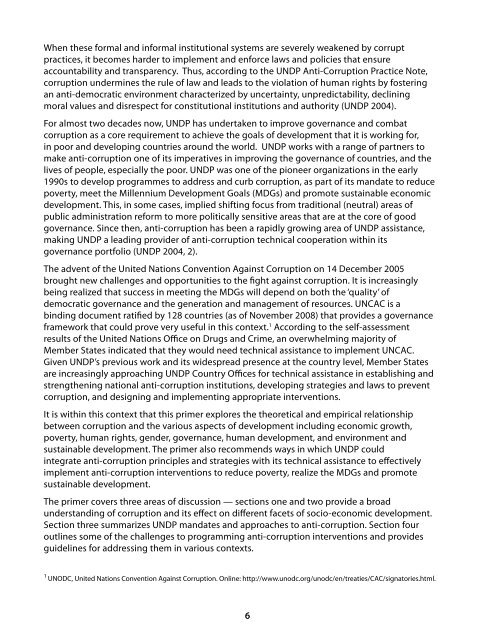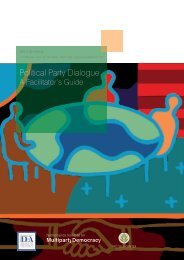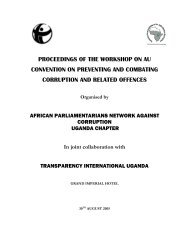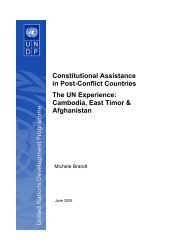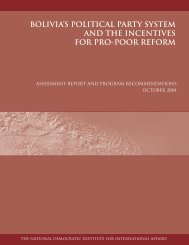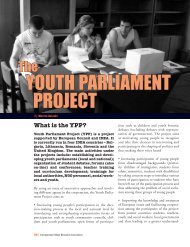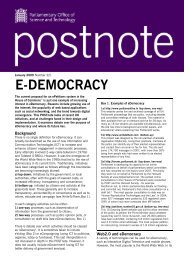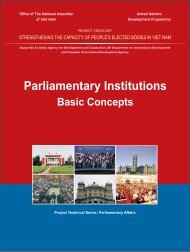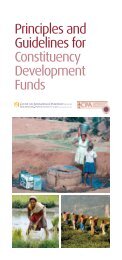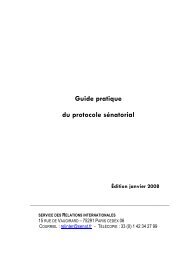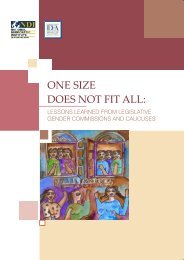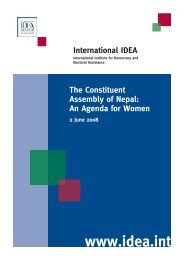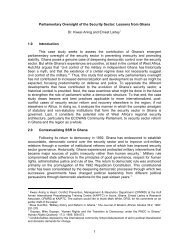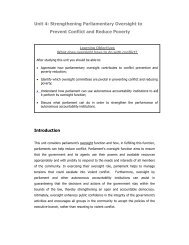Corruption and Development - pogar
Corruption and Development - pogar
Corruption and Development - pogar
You also want an ePaper? Increase the reach of your titles
YUMPU automatically turns print PDFs into web optimized ePapers that Google loves.
When these formal <strong>and</strong> informal institutional systems are severely weakened by corrupt<br />
practices, it becomes harder to implement <strong>and</strong> enforce laws <strong>and</strong> policies that ensure<br />
accountability <strong>and</strong> transparency. Thus, according to the UNDP Anti-<strong>Corruption</strong> Practice Note,<br />
corruption undermines the rule of law <strong>and</strong> leads to the violation of human rights by fostering<br />
an anti-democratic environment characterized by uncertainty, unpredictability, declining<br />
moral values <strong>and</strong> disrespect for constitutional institutions <strong>and</strong> authority (UNDP 2004).<br />
For almost two decades now, UNDP has undertaken to improve governance <strong>and</strong> combat<br />
corruption as a core requirement to achieve the goals of development that it is working for,<br />
in poor <strong>and</strong> developing countries around the world. UNDP works with a range of partners to<br />
make anti-corruption one of its imperatives in improving the governance of countries, <strong>and</strong> the<br />
lives of people, especially the poor. UNDP was one of the pioneer organizations in the early<br />
1990s to develop programmes to address <strong>and</strong> curb corruption, as part of its m<strong>and</strong>ate to reduce<br />
poverty, meet the Millennium <strong>Development</strong> Goals (MDGs) <strong>and</strong> promote sustainable economic<br />
development. This, in some cases, implied shifting focus from traditional (neutral) areas of<br />
public administration reform to more politically sensitive areas that are at the core of good<br />
governance. Since then, anti-corruption has been a rapidly growing area of UNDP assistance,<br />
making UNDP a leading provider of anti-corruption technical cooperation within its<br />
governance portfolio (UNDP 2004, 2).<br />
The advent of the United Nations Convention Against <strong>Corruption</strong> on 14 December 2005<br />
brought new challenges <strong>and</strong> opportunities to the fight against corruption. It is increasingly<br />
being realized that success in meeting the MDGs will depend on both the ‘quality’ of<br />
democratic governance <strong>and</strong> the generation <strong>and</strong> management of resources. UNCAC is a<br />
binding document ratified by 128 countries (as of November 2008) that provides a governance<br />
framework that could prove very useful in this context. 1 According to the self-assessment<br />
results of the United Nations Office on Drugs <strong>and</strong> Crime, an overwhelming majority of<br />
Member States indicated that they would need technical assistance to implement UNCAC.<br />
Given UNDP’s previous work <strong>and</strong> its widespread presence at the country level, Member States<br />
are increasingly approaching UNDP Country Offices for technical assistance in establishing <strong>and</strong><br />
strengthening national anti-corruption institutions, developing strategies <strong>and</strong> laws to prevent<br />
corruption, <strong>and</strong> designing <strong>and</strong> implementing appropriate interventions.<br />
It is within this context that this primer explores the theoretical <strong>and</strong> empirical relationship<br />
between corruption <strong>and</strong> the various aspects of development including economic growth,<br />
poverty, human rights, gender, governance, human development, <strong>and</strong> environment <strong>and</strong><br />
sustainable development. The primer also recommends ways in which UNDP could<br />
integrate anti-corruption principles <strong>and</strong> strategies with its technical assistance to effectively<br />
implement anti-corruption interventions to reduce poverty, realize the MDGs <strong>and</strong> promote<br />
sustainable development.<br />
The primer covers three areas of discussion — sections one <strong>and</strong> two provide a broad<br />
underst<strong>and</strong>ing of corruption <strong>and</strong> its effect on different facets of socio-economic development.<br />
Section three summarizes UNDP m<strong>and</strong>ates <strong>and</strong> approaches to anti-corruption. Section four<br />
outlines some of the challenges to programming anti-corruption interventions <strong>and</strong> provides<br />
guidelines for addressing them in various contexts.<br />
1<br />
UNODC, United Nations Convention Against <strong>Corruption</strong>. Online: http://www.unodc.org/unodc/en/treaties/CAC/signatories.html.<br />
6


